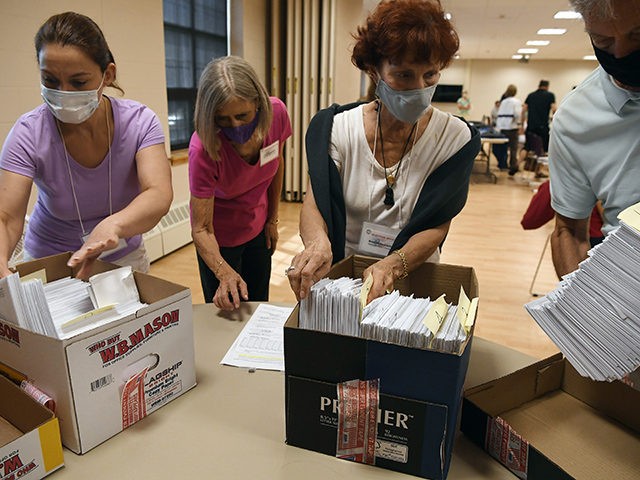A three-judge panel in the Ninth Circuit Court of Appeals on Wednesday upheld Arizona’s Republican-backed missing signatures law in what Republican National Committee [RNC] chairwoman Ronna McDaniel called a “win for election integrity.”
“Today’s ruling in Arizona is a win for election integrity and Arizona voters, who deserve to have confidence that their elections are free, fair, and transparent,” McDaniel exclusively told Breitbart News in part. “Requiring voters to sign their mail-in ballots by Election Day is a basic, commonsense regulation, and it’s significant that the historically liberal Ninth Circuit Court of Appeals agrees.”
In June 2020, the Arizona Democrat Party sued the state over its deadline for redressing missing signatures on vote-by-mail ballots, claiming the law violated the First and Fourteenth Amendments and denied voters due process. The RNC and Arizona GOP intervened to defend the deadline and successfully fought to ensure it was in effect for the November 2020 election. A lower court sided with Democrats and filed a permanent injunction invalidating the law. The RNC then appealed to the Ninth Circuit which vacated the injunction and upheld the constitutionality of Arizona’s law.
The Grand Canyon State has allowed voting by mail since 1991 and enables voters to do so during the last four weeks of an election.
Court documents detail:
A ballot with a missing signature is incomplete and cannot be counted. A voter may correct a ballot with a missing signature by submitting a signed replacement ballot by the election-day deadline. Arizona voters may verify a mismatched signature for three or five days after election day, but voters may correct a missing signature by election day at the latest.
In an opinion for the majority penned by former President Bill Clinton appointee Judge Susan Graber, the judges said missing the deadline “that Arizona long has imposed” is “through their [voters’] own negligence only.” Graber noted that Arizona’s law offers a “measure of grace” because election officials notify voters of his or her error and allow up until election day for correction.
“The state had an important regulatory interest in reducing the administrative burden on poll workers, especially during the busy days immediately following an election,” Graber wrote, adding, “In light of the minimal burden on the voter to sign the affidavit or to correct a missing signature by Election Day, the state’s interest sufficiently justified the election-day deadline.”
Judge Wallace Tashima, also a Clinton appointee, wrote the dissent, saying the law “disenfranchises voters.”
Tashima wrote:
The state’s refusal to provide a post-election cure period for ballots with missing signatures, consistent with the cure period it provides for other deficient ballots, disenfranchises voters after they cast their ballot as surely as laws that restrict voters from casting their ballots in the first place.
The RNC said the victory constitutes “another humiliating loss for Democrats in Arizona” following the U.S. Supreme Court’s decision in July to uphold Arizona’s ban on ballot trafficking and out-of-precinct voting in Brnovich v. DNC.
“This win builds on the landmark conservative victory Brnovich v. DNC and shows that Republican efforts to make it easier to vote and harder to cheat are working in Arizona and nationwide,” McDaniel concluded.
The case is Arizona Democratic Party v. Hobbs, No. 20-16759, in the United States Court of Appeals for the Ninth Circuit.
Katherine Hamilton is a political reporter for Breitbart News. You can follow her on Twitter.


COMMENTS
Please let us know if you're having issues with commenting.